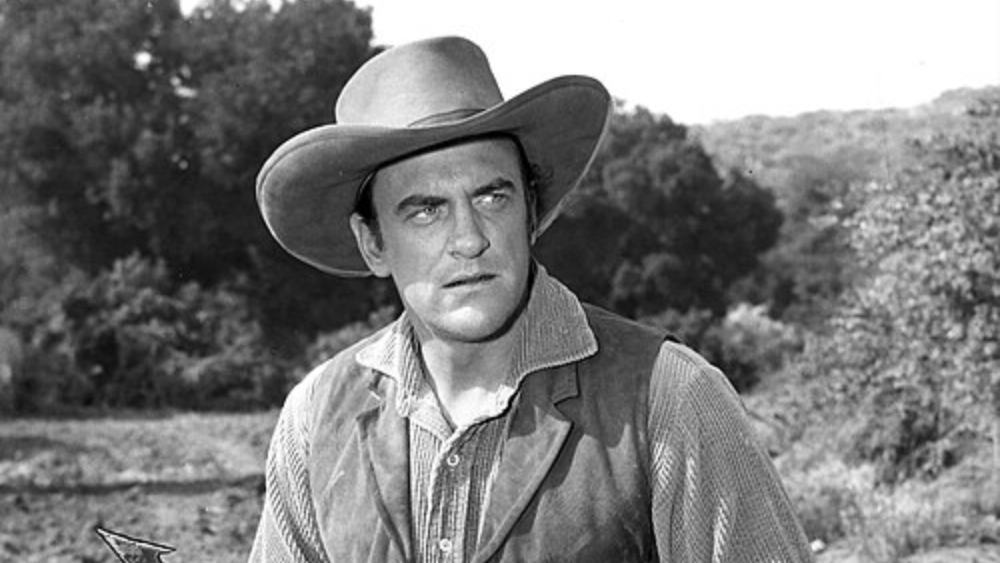James Arness is a name etched deeply into the golden era of American television. For two decades, he stood tall—literally and figuratively—as U.S. Marshal Matt Dillon in Gunsmoke, one of the most iconic roles in TV history. Before he became a legendary lawman on screen, Arness lived a life of real courage and sacrifice. He served his country in World War II. He overcame life-altering injuries with resilience. His journey from soldier to superstar is more than a Hollywood story—it’s an American legacy of grit and service.
Early Life: A Quiet Start in Minnesota
James Arness was born James King Aurness on May 26, 1923, in Minneapolis, Minnesota. He was of Norwegian and German descent, the eldest of two sons. His younger brother, Peter Aurness, would later become known to the world as Peter Graves, the star of Mission: Impossible. Arness grew up during the Great Depression, and like many young men of his generation, he developed an early sense of duty, resilience, and independence.
He attended West High School in Minneapolis and later enrolled at Beloit College in Wisconsin. However, his life took a dramatic turn when the United States entered World War II.
World War II: The Making of a Real-Life Hero
In 1943, at just 20 years old, the U.S. Army drafted James Arness. He joined the 3rd Infantry Division and fought on the front lines at Anzio, Italy, during one of the war’s most dangerous, pivotal campaigns.
On January 29, 1944, Arness was part of the amphibious landing at Anzio, an operation meant to outflank German forces and open the road to Rome. Arness took heavy machine gun fire to the right leg during intense combat, nearly losing it. Evacuated to a field hospital, he endured multiple surgeries and a long recovery before earning an honorable discharge.
He earned several military honors for his bravery. Among them were the Bronze Star and the Purple Heart. He also received the European-African-Middle Eastern Campaign Medal with three bronze battle stars. Additionally, he was awarded the World War II Victory Medal.
The wounds he sustained left him with a lifelong limp, and he experienced chronic pain throughout his career. Despite this, he rarely spoke about his injuries, choosing instead to push forward with a quiet strength that became a hallmark of his persona both on and off screen.
A New Path: From War to Westerns
Following his discharge, Arness returned to the U.S. and worked various jobs, including as a radio announcer. Encouraged by friends and his natural charisma, he decided to pursue acting and moved to Hollywood. He quickly found work as an extra and began landing small roles in low-budget films during the late 1940s.
Standing at 6 feet 7 inches, Arness’s towering presence made him an ideal fit for Westerns and war films. He played in several movies, including The Farmer’s Daughter (1947), Battleground (1949), and Them! (1954), a sci-fi film about giant ants that became a cult classic.
His big break, however, came when he caught the attention of none other than John Wayne, who became a mentor and advocate for Arness. The Duke saw Arness’s talent and actively recommended him for the lead role of Matt Dillon in the new television series Gunsmoke. Wayne even introduced Arness in a promotional video, helping to launch what would become one of the longest-running shows in television history.
Gunsmoke: Television’s Most Enduring Lawman
Gunsmoke premiered in 1955. It ran for 20 seasons until 1975, becoming the longest-running primetime drama in U.S. television history at the time. James Arness starred in all 635 episodes. He portrayed Marshal Matt Dillon, a character known for his stoic demeanor, unwavering morality, and deep sense of justice.
What set Arness apart in Gunsmoke was not just his physical presence but the depth he brought to Dillon. He played the marshal as a thoughtful, sometimes conflicted man who used violence only when absolutely necessary. His calm authority and quiet compassion made him beloved by audiences and respected by critics.
The show tackled themes of justice, morality, and community in the lawless town of Dodge City, Kansas, and Arness’s performance anchored it through decades of changing tastes and social norms.
Despite his injuries, Arness performed most of his own stunts in the early seasons. He rarely allowed his pain to be known, believing that the role demanded his best. Co-stars and crew admired his professionalism, humility, and dedication to the show.
Arness became a household name, and Gunsmoke became a cultural touchstone. At the peak of its popularity, it reached millions of viewers weekly and solidified Arness’s place in the pantheon of American television legends.
Beyond Gunsmoke: A Quiet Life of Integrity
After Gunsmoke ended in 1975, Arness didn’t chase fame or fortune. Instead, he enjoyed a quieter career, occasionally appearing in Gunsmoke reunion movies and other TV films. He starred in the miniseries How the West Was Won (1977–1979) and led the police drama McClain’s Law (1981–1982), showcasing his range beyond Westerns.
While he could have easily become a larger-than-life celebrity, Arness shunned the Hollywood spotlight. He rarely gave interviews and was known for his modesty. He often said that his greatest reward was the ability to do work he loved and entertain millions of viewers.
Despite his fame, Arness remained grounded. He spent much of his later life in Southern California, enjoying the outdoors, fishing, and spending time with family. He was married twice and had four children.

A Legacy of Valor and Virtue
James Arness passed away on June 3, 2011, at the age of 88. He died peacefully in his sleep at his home in Brentwood, California. The announcement of his death was met with an outpouring of tributes from fans, actors, Veterans, and Hollywood peers.
James Arness was more than just Marshal Matt Dillon. His iconic portrayal made him a household name, but his real strength lay behind the camera. He lived a life shaped by discipline, pain, and perseverance. As a veteran, he served with distinction and carried the scars of war quietly throughout his career.
His impact on American culture is profound. As the face of Gunsmoke, he shaped the image of the Western hero: honorable, composed, and committed to justice. As a Veteran, he represented countless people who came home from war and built new lives, carrying both trauma and strength with quiet dignity.
Honors and Recognition
Although Arness never sought accolades, people widely recognize his contributions.
- In 1981, he was inducted into the Western Performers Hall of Fame at the National Cowboy & Western Heritage Museum in Oklahoma City.
- He received a star on the Hollywood Walk of Fame at 1751 Vine Street.
- Several Gunsmoke reunion movies were produced due to the enduring popularity of his character.
- Veterans’ organizations have honored Arness posthumously for his service and for representing Veterans with integrity throughout his career.
Why James Arness Still Matters Today
In a time when celebrity culture often revolves around controversy or self-promotion, James Arness remains a refreshing reminder of what true character looks like. His blend of heroism—both on the battlefield and on screen—embodies values that still resonate today: honor, resilience, humility, and service.
You don’t have to be a fan of Westerns to appreciate Arness’s impact. His story is universal: a young man who answered his country’s call, who endured hardship with grace, and who used his platform to uplift rather than inflate. His portrayal of Matt Dillon provided a model of leadership that generations of viewers looked up to—firm but fair, compassionate but courageous.
Final Thoughts: A Salute to an American Icon
James Arness wasn’t just playing a hero—he was one. James Arness’s journey from wounded soldier to one of American television’s most respected actors proves what determination, honor, and heart can achieve.
As we reflect on his legacy, we see James Arness not just as a star but as a symbol of an era—a genuine American icon who commands remembrance for both his performances and his life of quiet valor.
Next time you watch a Gunsmoke rerun and see Marshal Matt Dillon walk into Dodge City, remember the man behind the character. He truly understood bravery—not only on screen but on the battlefield. Also, he faced pain with courage and lived a life of integrity. His story is one of real heroism worth remembering.











